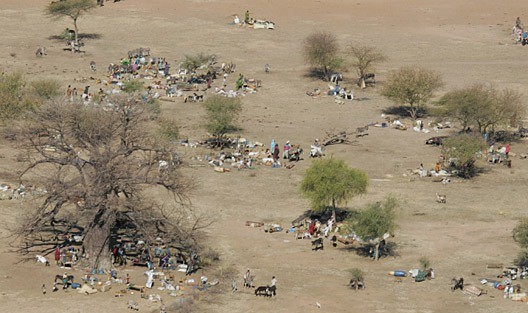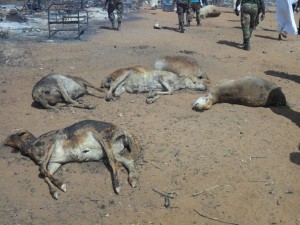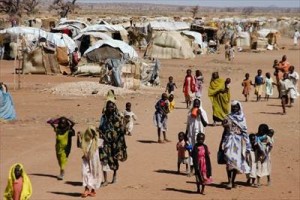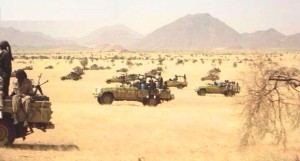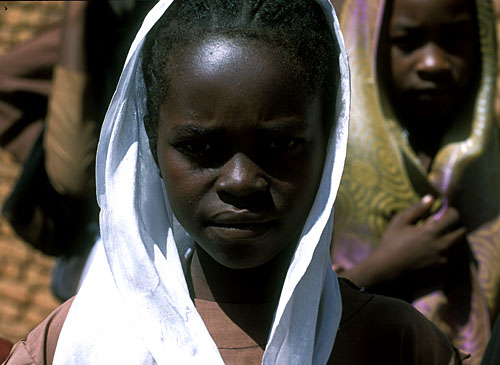This is the sixth installment of a digest containing what I believe to be the most important stories reported by Radio Dabanga in the previous week. Radio Dabanga has been by far our most important and reliable source of information about what is occurring in Darfur, and provides a great deal more than the UN/African Union Mission in Darfur (UNAMID), the UN Office for the Coordination of Humanitarian Affairs (OCHA), and the largely worthless quarterly reports of the UN Secretary-General. This week’s digest, comprising ten dispatches, includes more on deteriorating humanitarian conditions (see Digest 5) and violence against civilians that continues to grow.
This digest, per usual, looks back only a week, to March 30, 2015, and is still perforce highly selective. Most dispatches have been edited to some degree for length; any editorial comments on my part appear italicized in [brackets] and in blue; all emphases within the cited texts have been added.
Eric Reeves, 5 April 2015
Darfur: Radio Dabanga Digest, Number 1 | http://wp.me/p45rOG-1CD
Darfur: Radio Dabanga Digest, Number 2 | http://wp.me/p45rOG-1De
Darfur: Radio Dabanga Digest, Number 3 | http://wp.me/p45rOG-1Dt
Darfur: Radio Dabanga Digest, Number 4 | http://wp.me/p45rOG-1Ei
Darfur: Radio Dabanga Digest, Number 5 | http://wp.me/p45rOG-1EL
Darfur: Radio Dabanga Digest, Number 6 | http://wp.me/p45rOG-1Fp —and below
************************************
• “Lack of services in East Darfur’s Sheiria”: commissioner
March 31, 2015 | Ed Daein
The commissioner of Sheiria locality, East Darfur, has acknowledged the lack of services in the area. Speaking to reporters in the East Darfur capital of Ed Daein on Monday, Commissioner Mustafa Yousef admitted that the residents of Sheiria locality [formerly South Darfur] are suffering from insecurity, and a poor provision of clean drinking water, and health and educational services.
He expects that many people, who abandoned their villages in the locality in search of a safer place to live, will not be prepared to return, due to the lack of services. [This assessment is particularly ominous, given the Khartoum regime’s increasing emphasis on dismantling the camps and compelling the return of displaced persons.] The commissioner pointed to the existence of only one rural hospital in Sheiria locality, where currently one medical assistant is employed. This increases the suffering of the patients, he said, in particular pregnant women, who have to travel to Ed Daein for medical treatment.
The future for far too many Darfuris–forced from their villages or from camps for the displaced; they are extremely vulnerable to attack when in the open, as here.
• 29 veterinarians quit in West Darfur
March 31, 2015 | El Geneina
The West Darfur Minister of Agriculture and Livestock has accepted the resignation of 29 veterinarians in the state. The veterinarians submitted their resignation mid-2014, in protest against the appointment of Animal Production graduates as directors at the Ministry’s livestock departments in the West Darfur localities. The veterinarians requested the General Veterinarians Union to raise their case to “the highest authorities in charge.” Minister El Taher Abdelrahman Bahreldin on Monday ordered his ministry’s administration to process the resignations. [This callous contempt for the very considerable value of trained veterinarians in livestock-rich Darfur is entirely in character with the policies of the Khartoum regime, as administered by regime-appointed local officials.]
Livestock in Darfur have suffered terribly over the past twelve years, dying from bombings (they are highly susceptible to shock and their wounds often cannot be tended), from lack of food and water, and from lack of veterinary care.
• Sheikh of Otash camp slain in South Darfur
March 30, 2015 | Otash Camp / Kass
A leader of Otash camp for the displaced, east of Nyala, South Darfur was killed by militiamen today. “Three members of a government militia, wearing military uniforms, stormed the shelter of Sheikh Idris Mohamed Abu Shama, head of Centre 1, at 5am today,” another Otash camp elder informed Radio Dabanga. “They shot him and fled. We immediately took him to the Nyala Teaching hospital, where he died of his injuries.”
[An additional, highly reliable source on the ground in Darfur reports:
The killing of displaced people from Otash camp for displaced people in South Darfur state Nyala began at 5:00am on Monday, March 20, 2015. Three armed individuals wearing military uniforms and masks over their heads attacked the house of the Sheikh in the center of his neighborhood, shooting him at his home. His name: Sheikh Idris Mohammed Abu Sham, age 62 and married. He was the primary representative of the Forawi tribe.
The son of the late father says he had attended a meeting a week ago with the Government and UNAMID camp Otash about of the mission UNAMID within the camp. He spoke about his father’s wish that UNAMID would remain within the camp, and expressed concern about the humanitarian situation inside the camp: food, health and the security environment. This event also comes two weeks before his people’s national conference in Otash camp in connection with an election inside the camp.] [Khartoum has targeted many camp leaders for harassment, arrest, and murder by militia proxies.]
The grim life in Otash camp for displaced persons
• Disease kills 21 Darfuri children in Chad
March 30, 2015 | Eastern Chad
At least 21 children in the Darfuri refugee camps in eastern Chad died of a mysterious disease last week. The head of Iridimi refugee camp, near the West Darfur border, told Radio Dabanga that 15 children died of a disease causing fever, vomiting, and breathing difficulties. In Touloum refugee camp, six children died of the same symptoms, camp head Haidar Gardia reported. Both camp leaders requested the UN Refugees agency, UNHCR, to dispatch a medical team to the camps in eastern Chad, and contain the disease “before it kills more children.” [The fate of Darfuri refugees in eastern Chad is unbearably cruel, and humanitarian resources are not nearly adequate. Rapprochement between the regime of Idriss Déby in N’Djamena and the Khartoum regime has made access to remote eastern Chad a great deal more difficult; no cross-border assistance has been allowed from Darfur, and now there is no such capacity to help.]
• 43 Berti die in Ziyadiya militia attacks in North Darfur
March 29, 2015 | Mellit Locality
42 members of the Berti tribe were killed in a large-scale attack by Ziyadiya militiamen on villages in Mellit locality on Saturday. In an attack on Tofaya village on Friday, one villager was killed. A large group of Ziyadiya members of the paramilitary Border Guards, the Central Reserve Police (Abu Tira), and affiliated militiamen from other parts of Darfur entered the locality in 40 to 50 government Land Cruisers, armed with heavy weapons including mortars. Adam Amara, Deputy of the Berti King, told Radio Dabanga that they attacked a number of Berti villages and killed 42 civilians. “Eight others were injured. About 30 houses in five villages were destroyed by fire. “The villagers reported that the attackers took 290 camels, 260 sheep, 240 goats, and eight donkeys when they left,” he added.
Amara described the attacks on unarmed Berti villagers on Friday and Saturday as “ethnic cleansing,” and called on the Sudanese government “to perform its duty and protect the civilians who are being murdered in their homes.” [The Berti are one of the African/non-Arab tribal groups of Darfur; the Ziyadiya are an Arab tribe. Violence in Darfur continues to have a powerful ethnic inflection.]
The Rapid Response Forces (the “new Janjaweed”), the primary instrument of civilian destruction in North Darfur, as well as in other regions of Darfur and Sudan
• 48 killed, injured in militia attacks on North Darfur villages
April 2, 2015 | Mellit / Kutum / Kabkabiya
At least 48 people were killed and injured, and four others were kidnapped in an attack by a government militia on a number of villages northwest of El Fasher from Monday to Wednesday. Speaking to Radio Dabanga, a listener said that the militiamen raided the villages while they were returning to Kutum and Kabkabiya, after having attacked several villages in Mellit locality last Friday and Saturday. “The attacks started on Monday and continued until Wednesday. 41 villagers were killed, seven others were injured, and four were abducted. They pillaged the villages of Jambo, Ghireiban and Turra entirely, and stole a large number of livestock, a tanker belonging to the Darfur Regional Authority, and a fully loaded lorry.
Several people in Kutum and Kabkabiya locality reported the return of large numbers of militia troops to their bases in the two localities, after they had attacked villages in Mellit locality. They said that the militiamen returned in two batches. The first batch returned by Wadi Kafout Valley, and the second one by Wadi Wana. “Some of the attackers were riding on camels, driving about 400 camels to their bases in Kutum and Kabkabiya,” one of the sources said. “Others passed by, driving large numbers of other livestock to their bases, along with vehicles loaded with pillaged household items.” [Khartoum has give free rein to the militia forces in North Darfur, with horrific consequences for the African/non-Arab tribal groups of the region.]
• Soldier rapes 13 year-old girl in Tabit, North Darfur
April 2, 2015 | Tabit
An army soldier raped a 13-year-old girl in Tabit village in North Darfur on Tuesday. “The rape occurred in the girl’s house while her parents were absent,” one of the neighbours told Radio Dabanga. “After we discovered the incident, we hunted-down the culprit, who had returned to Tabit military garrison. The commander told us that he detained the soldier and will solve the problem with understanding.” [The utter contempt for the lives of African men, women, and children continues to be evident in the epidemic of rape used as weapon of war, entailing serious injury, humiliation, disgrace, and often death.]
Radio Dabanga reported on 2 November last year, that army forces raped more than 200 women and girls in Tabit. The soldiers said that they had been ordered to do so in their search for a missing colleague. The army troops conducted house-to-house searches in the village, robbed the residents of their belongings, severely beat them, and raped women and girls. During the two nights, the soldiers detained the men of Tabit en masse, threatened and abused them throughout the nights, while others continued raping. At least 221 women and girls were allegedly raped in Tabit over a 36-hour period. [Despite much bluster from the UN, Khartoum refuses to allow any further investigation of the mass rapes at Tabit—now authoritatively chronicled by Human Rights Watch.]
Far too often the victims of rape are girls from African tribal groups—girls just like this one.
• Two children die from “unknown disease” in Darfur’s East Jebel Marra
April 2, 2015 | East Jebel Marra
On Wednesday, two children died from high fever and vomiting in Tourada village. A resident of the village told Radio Dabanga that Ali Musa Ibrahim and Saadia Mohamed Adam, both five years old, died from a contagious disease that broke out among children in North Darfur’s Tawila locality, part of East Jebel Marra, two weeks ago. “The most obvious symptoms are high fever and continuous vomiting,” he said. “The disease has spread among children in the villages of Goz Dor, Taradona, Torodi, Nimeira, Wadi Ashara, and Dady. And there are no health services at all in the area.” [There can be little doubt that diagnosis and treatment would be possible if Khartoum would grant humanitarian access to eastern Jebel Marra; the have denied such access for years.]
• East Darfur tribal strife leaves at least 20 dead, injured
April 1, 2015 | Abu Karinka
At least 20 Ma’aliya and Rizeigat tribesmen were killed and wounded in Abu Karinka locality on Wednesday. Speaking to Radio Dabanga, multiple witnesses reported that the fighting erupted after Ma’aliya militants fired on a Rizeigat “rescue team” in the area of Sabanema. The rescue team was formed to trace a number of sheep stolen from a Rizeigat tribesman, allegedly by Ma’aliya tribesmen. “The clash resulted in the death or injury of at least 20 tribesmen from both sides, although the majority of them are Rizeigat” the witnesses reported. The situation has become very tense, the sources said. Large groups of militants from both tribes are gathering in the area. “Renewed fighting may break out at any moment,” one of them predicted. Ali Tahir Sharef, Commissioner of Abu Karinka locality, told Radio Dabanga that an army force intervened and “is in control of the situation.” He declined to provide details of the number of dead and injured. [Amidst the violent chaos of Darfur, inter-Arab tribal fighting in recent years has received insufficient attention as a crisis in its own right. The causes are many, the tribes involved numerous, the inability of Khartoum to control the violence all too conspicuous.]
• Militiamen kill two in Mellit, child dies by bombing in North Darfur
April 3, 2015 | Mellit /Fanga / Kass
Two men were shot dead at the hands of pro-government militiamen in Malawi area, close to Mellit, North Darfur, on Thursday. The killing took place against the backdrop of the raids in Mellit locality earlier this week, in which militiamen reportedly killed at least 48 people. Thursday also witnessed an aerial bombardment in East Jebel Marra, resulting in the death of a child. In Kass, a man was shot dead by militiamen.
A relative of one of the dead reported to Radio Dabanga that the militiamen, driving five vehicles mounted with Dushka guns, were on their way to Kabkabiya after participating in the raids on several villages in Mellit last weekend and from Monday to Wednesday.
Passing through Malawi, the militia troops robbed about 97 camels, nine donkeys, and SDG 50,000 ($8,318). A rescue team was set up by the local population to chase them. When the team confronted the thieves, Shumi Abaker Ahmed and Abdel Rahman Ahmed Dud were shot dead.
Aerial bombardment
A child died by an explosion when the Sudanese Air Force bombed an area near Fanga, in East Jebel Marra, on Thursday. A number of livestock was killed too, and the large tracts of farmland were burned down. A witness told Radio Dabanga that an Antonov aircraft flew over Burgo area, north of Fanga, for a long time, before it dropped seventeen bombs. The 8-year-old Saleh Goma Saleh was killed inside her house. “The latest attack sparked panic amongst the residents in the area, who have fled into the woods and mountains.
The military leadership in Khartoum, including “Field Marshal” and President Omar al-Bashir continue to use indiscriminate aerial attacks against civilians targets—and do so with impunity. That the international community cannot bring a halt to this barbaric military conduct will be a lasting and shameful legacy of the conflicts in Darfur, Blue Nile, and South Kordofan.
Militiamen kill during robbery
In Kass in South Darfur, a man was shot dead by two pro-government militiamen on Thursday, a witness reported to the radio station. The men were riding on two camels and wearing military uniforms when they attacked a number of people in Bakin neighbourhood in Kass. They tried to rob them at gunpoint. When the people refused to cooperate, shot dead Osman Abaker Mousa.
[Violence—unrelenting, pervasive, ethnically-targeted violence—remains the dominant feature of life, and death, in Darfur. That we have entered the thirteenth year of genocidal violence, with no end in sight, makes clear that the “responsibility to protect”—unanimously adopted by the UN General Assembly in September 2005 and by the Security Council in spring 2006—has done nothing to change the world’s attitudes toward difficult, but urgent crises of protection.]
*******************************
“The victims [of the Holocaust] perished not only because of the killers, but also because of the apathy of the bystanders. What astonished us after the torment, after the tempest, was not that so many killers killed so many victims, but that so few cared about us at all.”
[Elie Wiesel, “Why were there so few?”]
